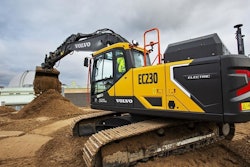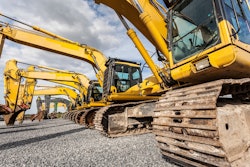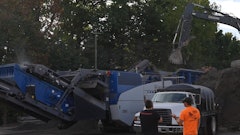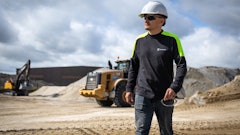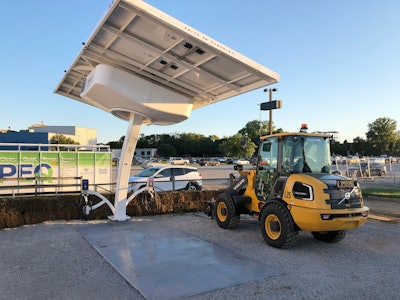
Beam Global, which provides products and technologies for electric vehicle (EV) charging and energy storage is partnering with Volvo Construction Equipment to bundle Beam EV ARC off-grid charging systems with a purchase of Volvo electric equipment.
The partnership is designed to allow construction sites to rapidly deploy EV charging, without the requirement for electrical work, utility grid connections or fossil fuel generators, to power zero-emissions construction equipment that runs on the sun and does not generate a utility bill.
"The construction industry has the opportunity to future-proof its business against noise, carbon emissions regulations and volatile fossil fuel costs by adopting electric machines," said Beam Global CEO Desmond Wheatley. "By providing our sustainable EV charging systems alongside Volvo's best-in-class electric machines, we are enabling that transition in the fastest, cleanest and most scalable manner available. We're proud to partner with Volvo CE in electrifying the construction business."
Volvo CE currently offers five models of electric machines in North America, the L20 and L25 Electric wheel loaders, and the EC18, ECR18 and ECR25 Electric excavators. Now Volvo dealers can bundle transportable, off-grid solar EV charging systems with electric machine orders. Together, the EV ARC and Volvo electric machines produce zero emissions, significantly reduce noise levels and lower energy costs.
"The Volvo CE line of zero-emissions construction equipment can now be charged with a zero-emissions energy source provided by the EV ARC. Beam Global shares our vision to electrify mobility worldwide, a critical step towards mitigating climate change and reducing noise and air pollution," said Ray Gallant, vice president of product management and productivity at Volvo CE. "The construction industry is ready for an energy transition that reduces emissions and improves machinery's performance, longevity and usability. We're committed to an electric future and view Beam Global as a strategic partner on this journey."
Beam Global's EV ARC, the fastest deployed and lowest-cost EV charging system on the market, is the ideal solution for Volvo CE's electric machines. Compact and easily transportable, the EV ARC system can be set up and ready to use in minutes. The EV ARC is fully autonomous, meaning it generates, stores and delivers electricity independent of the grid. Whether the project is in a remote nature preserve or a densely populated city with strict zoning rules, the solar-powered EV ARC can be deployed without any electrical work or permitting.
The offer is available through the Volvo dealer network. Because the EV ARC is part of the Extended Offer Catalog, Volvo Financial Services can be used to lease or finance the bundled EV ARC and compact electric machines with flexible financing options.
McKinsey & Company estimates that construction is an $11 trillion industry that accounts for 13% of global GDP. The global construction equipment market is projected to grow from $142 billion in 2021 to $224 billion in 2028 according to Fortune Business Insights. The United Nations Environment Programme finds that the buildings and construction industry accounted for 38% of global carbon emissions in 2019. With many governments aiming to achieve net-zero emissions by 2050, electric machinery will become essential. Residential and commercial builders and equipment rental companies are likely to add electric vehicles to their fleets. Federal agencies such as the U.S. Department of the Interior and the U.S. Department of Agriculture already use electric machines in remote, environmentally sensitive areas.





